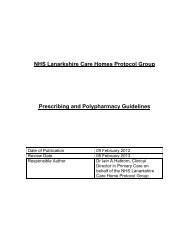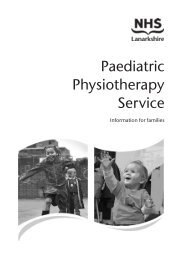Palliative Care Guidelines - NHS Lanarkshire
Palliative Care Guidelines - NHS Lanarkshire
Palliative Care Guidelines - NHS Lanarkshire
- No tags were found...
You also want an ePaper? Increase the reach of your titles
YUMPU automatically turns print PDFs into web optimized ePapers that Google loves.
<strong>Palliative</strong> <strong>Care</strong> <strong>Guidelines</strong>: Choosing and Changing OpioidsChoosing and Changing Opioids in <strong>Palliative</strong> <strong>Care</strong>Introduction• Opioids are used for pain and breathlessness.• Most palliative care patients respond well to titrated oral morphine.• A small number of patients may need to be changed to another opioid:o Oral route is not available.o Pain is responding but patient has persistent, intolerable side effects. (Consider reducingthe dose and titrating more slowly or adding an adjuvant analgesic before changing opioid)o Moderate to severe liver or renal impairment.o Poor compliance with oral medication.o Complex pain (consider adjuvant analgesics/ other pain treatments).Choosing an opioid for moderate to severe painFirst line opioids: (see: Pain management)Morphine• Range of oral preparations; SC injection and in a syringe driver/ pump.• Renally excreted, active metabolites – titrate morphine slowly and monitor carefully inchronic kidney disease.• Consider other opioids in stage 4-5 chronic kidney disease, dialysis patients.• Low doses and slow titration in liver impairment.Diamorphine• Highly soluble opioid used for SC injection and in a syringe driver/ pump.• Use for high dose SC breakthrough injections (above 180mg SC morphine/ 24hrs).Powder preparation is diluted in a small volume of water for injections.• As with morphine, cautious use in renal and liver impairment.Second line opioids:Oxycodone• For moderate to severe pain if morphine/ diamorphine are not tolerated.• Immediate and modified release oral preparations; SC injection; syringe driver/ pump.• Low concentration of preparation limits dose for SC injection to 10mg (1ml).• Avoid in moderate to severe liver impairment, clearance is much reduced.• Mild to moderate renal impairment: reduced clearance so titrate slowly and monitorcarefully. Avoid in stage 4-5 chronic kidney disease.Fentanyl• Topical patch lasting 72 hours; use if oral and SC routes unsuitable.• For stable pain if morphine is not tolerated; dose cannot be changed quickly.• No initial dose reduction in renal impairment but may accumulate over time.• Liver impairment; dose reduction may be needed in severe liver disease.Third line opioid: (seek specialist advice)Alfentanil• Short acting, injectable opioid for SC injection and in syringe driver/ pump.• In episodic/ incident pain can be given sublingually or subcutaneously.• Standard dose in renal disease including stage 4-5 chronic kidney disease.• Clearance may be reduced in liver impairment; reduce dose and titrate.Fourth line opioid: (specialist use only)Methadone• Oral methadone is used by specialists for complex pain; dosing is difficult due to the longhalf life; no renal excretion so standard dose in chronic kidney disease, half life prolongedin severe liver disease.© <strong>NHS</strong> Lothian Issue date: January 2009 Review date: March 20121

















